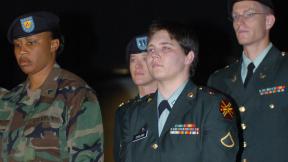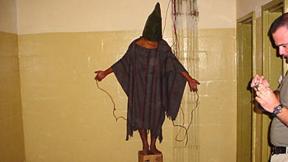
The photos of American soldiers abusing Iraqi prisoners have stunned and disgusted the world. But it is their sexual humiliation that is garnering much of the attention.
While such images shocked America, most Americans may not be able to comprehend what type of cultural threshold has been crossed in terms of dealing with Islam and Muslims.
In a culture that sometimes values life less than honor, we have done the ultimate act of dishonoring people. May God forgive us.
Most of the Muslim world sees America through the eyes of Hollywood movies, which is far from an accurate portrayal of American morality. Nonetheless, there certainly is a big cultural gap in the way people in the West deal with modesty and privacy of the body, and the way individuals in the Muslim world do, regardless of their level of Islamic practice.
This Islamic sensibility of considering the human body part of a very personal realm is connected to the concept of honor, dignity and privacy. This is not limited to Muslim countries. In fact, it is found in many Eastern cultures as well, such as in India and China, at a far higher level than in the West.
What American soldiers have done in Iraq plays right into the hands of the stereotypical Muslim image of Americans as immoral people or "Hayaless" people.
What is Haya? Haya, Satr, Nikah, and Hijab are four important concepts that will help explain the deep pain the Muslim world is facing while watching the nightmare of sexual torture in Iraqi prisons.
Concept of Haya
Ask anyone in the Muslim world, whether Muslim or not, he or she will know what Haya is. But if you ask them to define it, they will be hard pressed to do so. Haya is in the grain of personal and social morality, values and behavior. The concept of Haya is considered a major Islamic virtue and an integral part of human character.
There is no exact English word which can convey the whole meaning of the Arabic term Haya. Most people translate it as modesty, shamefulness, and shyness. But all these words have negative connotations that Haya does not have. Haya, unlike shyness and bashfulness, does not indicate that a person lacks self-confidence. In fact, in Islamic history, the person most noted for Haya was the third Khalifa Othman, may God be pleased with him.
A person with Haya is not a shameless person. He or she is chaste, innocent, moral, restrained, upright, and virtuous. He or she is not immodest, immoral, indecent, lewd, unabashed, unashamed, unblushing, and unchaste. No, we are not talking about angels here. A Muslim goes up and down in his or her faith and practice, but the ideals of Haya are such.
Prophet Muhammad, peace and blessings be upon him, said that every way of life has its distinct character and for Islam it is Haya (Muwatta). He also said Haya is the fruit of faith. (Bukhari, Muslim).
Haya is not morality to be imposed, but something that must arise from within a people. But at the same time, it is not a private affair. It is an established and accepted social morality which members of society collectively regard as desirable.
A state, therefore, is expected to be the organ through which any society mediates its moral values. This is the reason we find that the Malaysian government asked for the removal of nude scenes from the movie Schindler's List. It's ironic that many television stations in the Muslim world look for Christian-themed films from America to run on their stations because they feel these come close to the Haya standards of their societies.
Public Haya is also the reason that even in secular Muslim countries you will not find collective shower rooms in school dorms, community gyms, or army barracks where persons of the same gender freely undress and shower in front of each other. I remember choosing not to stay in a dorm in Chicago at a high cost to me because of this common shower area issue.
Haya is the reason many Muslim men and women prefer to be seen and treated by a doctor of the same gender. Haya is also the reason that Muslim men and women avoid situations where they will be alone with a non-related member of the opposite sex.
It is also because of Haya that you will not find the demonstration of public affection between spouses in public. That loving relationship is considered a private joy.
It is due to Haya that while romance is there, even in the secularist-run television stations of the Muslim world, bedroom scenes, explicit language, and sexual innuendo are not part of the shows. Of course, all of that is being challenged by satellite TV, which brings the Hollywood version of America to Muslim homes around the world.
While Haya is an expected norm of personal behavior defining social morality, the basic Islamic personal law taught to Muslim children in homes or weekend schools around the world, from the United States to the United Arab Emirates includes the following concepts of Satr, Hijab and Nikah.
The code of Satr
Satr is another important code to understand when considering the implications of the prison abuse scandal. Muslim men and women are asked by Prophet Muhammad, peace and blessings be upon him, to observe Satr. This means Muslims must keep their bodies from the navel to the knees covered in front of others. The only exception to this rule is one's spouse.
Satr explains why in the dress of Muslim countries, there is no exposure of the human body. Muslims will go to great lengths to avoid this. In many villages, people have refused to see physicians if they needed to undress for them. This prompted Imams to preach that a Muslim can undress in front of a physician if this is required for treatment.
The horrific images from Abu Ghraib prison are probably the first time so much nudity has been revealed on public television in the Muslim world.
The Etiquettes of Hijab
"Tell the believing men to lower their gaze and be modest. That is purer for them. Lo! God is aware of what they do..." (Quran 24:30-31)
Due to the secular fundamentalists who have banned the "headscarf" in Turkey and France, many people in the world now think Hijab means headscarf. In the fight for the hearts and minds of Muslim women, the headscarf has become a symbol of assertion for Muslim feminists as well as a symbol of women's oppression for most Western feminists. However, the concept of Hijab has a much broader meaning than a piece of cloth on a woman's head.
The etiquettes of Hijab go beyond a dress code. It defines the relationship that men and women in a Muslim society maintain with each other. It lays out the guidelines for interaction between the sexes, particularly those not related to each other by marriage or blood. In essence, it is a set of legal and social norms that define gender relations in the public and private space in the Muslim world.
Even Muslim architecture incorporates the element of Hijab in defining public and private place within one's own home.
The Institution of Nikah
Nikah means marriage in Arabic. This is the only relationship in which an adult man and a woman can see each other's bodies. It is not surprising, therefore, to note that dating still remains unheard of in the Muslim world, despite the practice's introduction through Western television programs in the region.
Extramarital sex is considered a major sin in Islam, and Muslims are encouraged to marry. This is why in several Muslim countries, governments offer a stipend for eligible couples to get married if they cannot afford to.
Of course, there are people who do have affairs in the Muslim world. But this is considered a serious crime against one's family, the community, and a major sin from a spiritual perspective.
The institution of marriage in the Muslim world has been seriously challenged by the cultural imports from the West. However, its strength despite these pressures, prompted former US President Jimmy Carter to note that the only countries in Africa where AIDS has not become an epidemic are Muslim countries.
Conclusions
The concepts of Haya, Satr, Nikah, and Hijab are Islamic values, norms, and etiquettes. Although not all Muslims may live up to these ideals, social morality is still defined by these norms in the Muslim world. And nudity is nothing but the antithesis of Haya, even by those who may not be living by these ideals in the Muslim world.
It is bad enough when men are involved in violating any of the above concepts. But when Muslim women are violated based on these ideals, it serves as further fuel to fire.
Breaking these norms is taken extremely seriously in Muslim societies. Many states treat crimes against these norms so seriously that they use capital punishment.
Unlike what some in America lead us to believe, no one hates America in the Muslim world because of democracy and freedom. It is the immorality of America (championed by Hollywood), along with American foreign policy which defines the conflict between the Westernized elite and religious elements in Muslim societies.
While many countries in the Muslim world have mastered the art of torture and killing, the wholesale onslaught on Muslim cultural sensibilities has never been observed in the public square before the Abu Ghraib prison abuse scandal. Graphic images of this criminal behavior by some members of the most organized and educated army of the only superpower in the world are bound to become the most dominant images of this new "Crusade" in the collective psyche of Muslims.
Photo Attribution: http://commons.wikimedia.org/wiki/File:THIRD_FLOOR,_HOLDING_CELL_NO._3,_VIEW_FROM_WINDOW_-_Charleston_County_Jail,_21_Magazine_Street,_Charleston,_Charleston_County,_SC_HABS_SC,10-CHAR,348-87.tif





Comments
As Alllah said that he will not change conditon of a group of people until thay change what is in their mind.We muslims have slept and we need to wake up and present the real Islam to non-Muslims for them to appreciate the Unqueness of Islam as the solution to world Problems.
Location
The brother hit that right on the button. I agree totally myself. It would be easier in an Islamic country. Here in America it is sexually driven. I am myself caught up in the perils of this dunya. I keep hoping I will wake up and regain my focus on the deen. I am glad to see that with all that we are going through we all looked at this site so none of us have given up. ASalam alikkum wa rahmatullah wa barakatu.
Location
Thank you for an informative and well-written article. Like the overwhelming majority of Americans, I was likewise mortified and outraged by the actions of our soldiers--more so than words can express. I am afraid, however, Naima is ill-informed and further perpetuating an Anti-American sentiment when she commented about the "mental and social health of Average Amercians." What those soldiers did in no way represents the "average American." There is no one I have heard, met, seen, or read who supports the actions of those soldiers. I am also curious as to why American's immorality as it relates to our movies, television, and own activities so offends Muslims. I am not speaking about the evil done by these soldiers. But, you refer to American's immorality, particularly as seen in our movies and TV being that which incenses Muslims. Why should that offend others? What I mean is, your beliefs and behaviors do not offend me, why should you all be so angered by what we do when it doesn't affect you. You mention an infiltration of "immoral" Hollywood films, why simply do you choose not to show those films and be done with it? Why even concern yourselves with our mores and behaviors?
Location
asalaam alikum observe haya and you are a precious jewel.disregard it and you know you just lost that treasure.fi amanillah
Location
As a person who was born and raised Christian, I found this article very informative and interesting. It reinforces my belief that the Muslim religion in itself is a peaceful religion. I was very outraged with the prisoner abuse and I hope that the Muslim communities can understand that those soldiers do not represent the entire western culture, the entire US military, nor the entire American culture. I understand that these issues are appauling to the Muslim world and I am just beginning to try to understand the Muslim religion better. With all that is going on, it is of utmost importance for us all to try to understand each other and our differences because that is the only way we will be able to find peace. I thought highly of this article. In my further readings, I hope to find that the Muslim religion does not actually support those who justify the beheadings and the acts of the terrorists. This is a large world and I truly believe that there is enough room for us all to practice our own beliefs in peace.
Location
As a Christian, I found this article very informative and helpful to my understanding of the effects of Abu Grahib, as well as some of the Islamic mindset in general. Thanks and Peace, KLR
Location
Assalam o alaikumWhat a coincidence; Last evening I listened an audio tape of Dre. Farhat Hashmi " Jub haya na rahay" . and today I am reading your article on the same topic. Both are the best in my knowledge. May Allah guide us to understand them and follow them. Wassalam
Location
Salam alaikum. Great contribution. It is all over the world. I pray that we'll all identify the values of Islam and we would practice Islam as it should be and not judge Islam based on what some supposedly Islamic countries do.
Location
Assalamu'alaykum warahmatuallah!May Allaah reward you well for such a wondeful article, i'd lyk to thank you on my behalf as i learned new and interesting things, May Allaah Be With You Always Wa'salamu'alaykum ! x
Location
As salaamu alaikum. Thank you for this very informative article. I have forwarded it to nonMuslims among my friends and family to help them understand. Unfortunately mere words can not explain the depth of attack these acts have made on the world's 1.3 billion Muslims. It will take many decades and much good will to erase this. Even more frightening is what the behavior says about the mental and social health of the average American - after all, the soldiers in question are our children and neighbors. What will they be doing and who will they victimize when they come home? May Allah protect us all from error.
Location
Pages
Add new comment